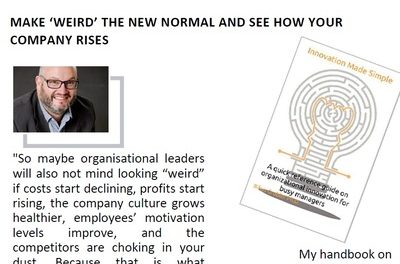
Innovation and change matter to so many companies and organisations, but what are they?

By Dr Rikus Grobler of Namibia Innovation Solutions
Whenever there is a request to define innovation, I compare it to other terms like “invention” and “creativity”.
Ultimately, my definition for innovation, in the context of corporate innovation, is: “Innovation is the application of resources to create value for the customer and the enterprise by developing, improving and commercialising new and existing products, processes and services.”
So why all the hype about innovation? In this series of articles I want to state the case for innovation and why it matters for any organisation that wants to prosper.
Why pursue innovation?
For me there is one quote that summarises best why the pursuit of constant innovation is crucial. This is by the influential writer and management consultant, Peter Drucker, who said: “Innovation is the only competitive advantage a company really has, because quality improvements and price reductions can be replicated, as can technology. Therefore, if a company could have just one major capability, it should be innovation”.
The two realities every business face, is firstly that there will always be competition and secondly that the market environment is constantly changing. These changes can manifest itself in many forms; it can be technological-, legal-, economical-, political- or environmental change, to name a few, and the organisation will feel the impact of change on the bottom line, growth or the most severe one, sustainability.
We are all aware that in these economically challenging times, it has become harder and harder to fight for your share of the customer’s wallet. The principle never changed, and it still holds true today and will forever: Survival of the fittest. To be the “fittest” you need to outsmart your competitors and adapt to the changing circumstances to your best benefit.
Let’s look at a few examples where the “fittest” survived. VHS killed Betamax, for Generation Y, who will probably not know what this means. A better example would be: the iPod killed the MP3 player. Digital photography caught Kodak off guard and where Kodak was once the leader in photographic equipment, they are almost unheard of today.
The world’s most renowned watchmakers, the Swiss, took a serious hit when the Japanese started utilising quartz technology in watches in the early 1980s. Google toppled Yahoo in the search engine race. Amazon disrupted book retail at first, and these days almost anything from electronic devices to sporting equipment.
Yes, these examples are of renowned global companies, but it is easy to relate to these examples, because we as consumers in the global village lived through these scenarios. The point I am making is that these organisations had serious competition in the form of market leaders, and all of them were exposed to the same technological and market changes, but they outsmarted the competition and became the market leaders.
Applying this principle in our business environment in Namibia, innovation is the key to help your organisation become the “fittest” through development of new products and services that enlighten your customers, reduction of operational costs, improving customer satisfaction and employee engagement, and to see your revenues and margins increase steadily.
Create value through implementation of ideas. Ideas which people have had made the difference in the whole history of man, simple ideas and complex ideas, little ideas and big ideas. What unknown genius first discovered the wheel? Who was the person who discovered wheat could be made into bread? Our whole world is defined by the people who had the ideas that made possible the automobile, the bridge, the skyscraper, the airplane, the ocean liner, the telephone, the light which turns night into day, mobile telephony. Innovation is your silver bullet for survival.
Next Time
In the next delivery I will discuss how to decide where to focus innovation to get the most out of it. I conclude with a quote by Harvey Firestone: “Capital isn’t so important in business. Experience isn’t so important. You can get both these things. What is important is ideas. If you have ideas, you have the main asset you need, and there isn’t any limit to what you can do with your business and your life.”












































